7th ITB Hospitality Day on "brands": Hoteliers define them for their world
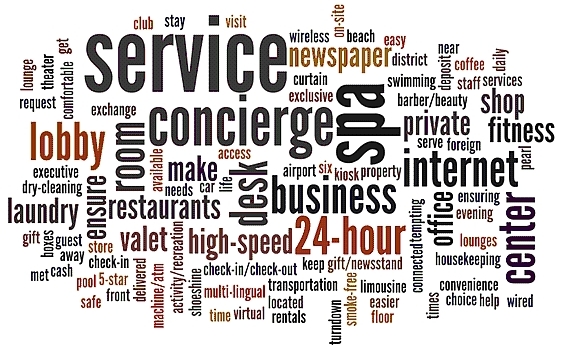 |
|
| A word cloud as a result of an Interbrand analysis of 40-50 hotel groups and their profile: all terms are exchangeable. |
Berlin (March 30, 2012). Western brands have dominated Asia for many years and now the Asians are striking with a countermove. Does a brand chaos come along and how many brands does the world need? Experts from the Chinese Jin Jiang Hotel Group and from the western top dog, Marriott Hotels, discussed this at the 7th "ITB Hospitality Day", the hotel conference of the ITB. In addition, Cassidy Morgan, CEO Central and Eastern Europe with the globally operating brand consultants, Interbrand, provided the introductory key note speech. He backlit the brands for their core standards and how they can become strong in the digital context today. It appeared, however: The hoteliers live in their own company brand world.
"Brands can change life!”, according to Cassidy Morgan's opening statement: Coca Cola, Google and iPhone are such strong brands. And in the hotel industry, "it is everything!", hotels have no profile, according to the following statement. Through the development of a "Word Cloud", Interbrand has discovered that between 40 and 50 hotel groups all use the same concepts. "Only Ritz-Carlton has managed it," he said, "and the ice hotel in Sweden."
There can be nothing worse than not differing from each other in anything, says the brand expert. Where is the history of the brand? It only offers the protection of the (later) value. In addition, Morgan listed four internal and six external criteria that every company should adhere to; under this are the values and standards like clarity, responsiveness, authenticity, market relevance, differentiation …
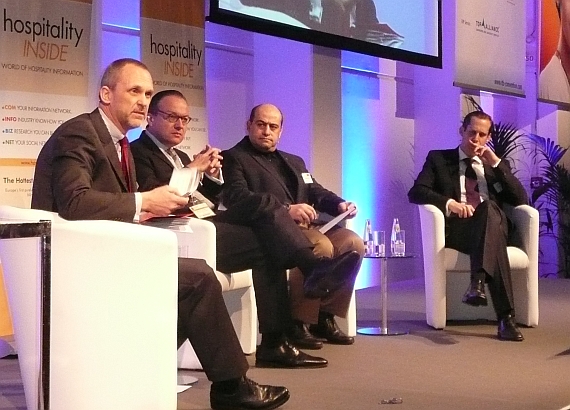 |
|
| Hotel groups define brands by niches: During the 7th "ITB Hospitality Day" moderator Gerhard Fuchs discussed the topic with Bernold Schroeder of Jin Jiang, Osama Hirzalla of Marriott Hotels and Cassidy Morgan of Interbrand. / photos (5): map |
Moreover, Cassidy Morgan stressed the increasing meaning of the "digital realm" that changes brands and makes them strong. Coca Cola plays with Social Media perfectly – and with this, they are only selling sugared water. Burberry has been known as the "trench coat for old people", now the digital revitalisation has raised the customer connection and has lowered the inhibition threshold for the shop visits. Those who do it right bring the customer back and they then happily pay more, he summarised.
The "Customer Journey" has not been linear for a long time and the relationship with the customer starts before the journey and not with the question of whether their stay was in order... His provocative question at the beginning as well as at the end was the same one: Is your brand capable and strong enough to change the world?
Brand goal: Jin Jiang for all
Then, however, in the following talk round in which Cassidy Morgan also took part, this was met by the certainly self-convinced hotel brand representatives of whom the fundamental Interbrand criticism quite obviously bounced off of. Only the Jin Jiang CEO differentiated, Marriott was extremely self-confident and omniscient.
In 2012, presumably only a few knew the Jin Jiang name in the plenary session of the ITB Hospitality Day. However, this should change. The big Chinese group is stretching its feelers to the west. It has already connected with the Spanish hotel company, Meliá, in an intensive cooperation. But in the medium term, the Jin Jiang CEO, Bernold Schroeder, is also aiming at the introduction of their own brands.
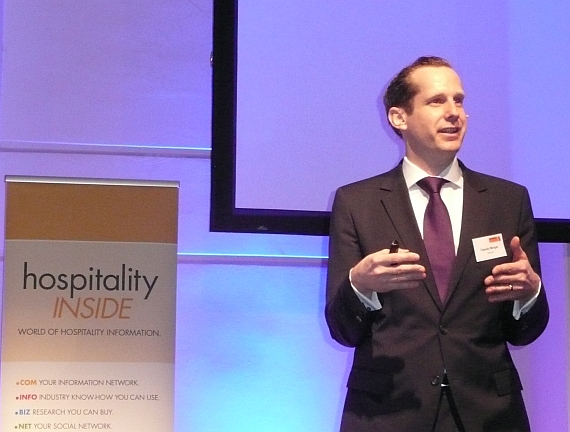 |
|
| Cassidy Morgan during his key note speech. |
This might only confuse western customers more, but make travelling easier for the Chinese. Schroeder: "Most countries in the world have regional brands. The travellers are happy when they find these brands somewhere else. This is also valid for China. When the Chinese travel internationally, they are pleased about the hotels that provide a home feeling for them."
So his company has introduced the Jin Jiang brand and will next allow it to further follow in other segments. And their name recognition will be developed. "The day will come when the guest travels to a Jin Jiang Hotel," Schroeder is convinced. In the long term, he can also imagine a Jin Jiang Hotel in Berlin's Kurfuerstendamm. But, good things take time: "It will take from five to ten years to build up a brand for China. Therefore, we have still have not developed a foreign strategy. We still orientate ourselves around the home market. Only in the end of 2013, will we make the plans to go beyond this", says Schroeder.
Hotel brands only satisfy niches
Brand consultant, Cassidy Morgan, CEO Central and Eastern Europe with Interbrand, views the brand variety within the industry rather sceptically: "People do not know the difference. Instead of creating a large brand, many small, niche brands have been created for different target groups", he said. Osama Hirzalla, Vice President Brand Marketing and eCommerce Europe with Marriott International, confirmed: "We have 15 different brands. We adapt the brands to the markets and the customer groups." But as a rule, the brands are differentiated from the established core brands. "There is no overlapping in the Marriott brands", he emphasised.
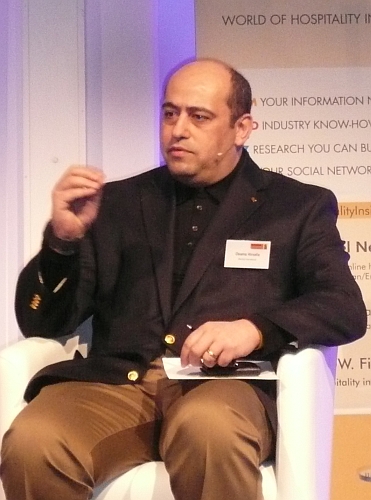 |
|
| Osama Hirzalla. |
For what does a hotel generally need a brand? "It must raise the added value for the owner", explained Hirzalla. "A brand like Marriott gives security to the owner", Schroeder supported him. But: Nevertheless, a small boutique resort can also exist without a brand. "Franchising is a good measuring stick for what a brand brings along", he advised.
The experts assess the expansion of Kempinski abroad as very successful. "Kempinski has done a wonderful job in Asia", says Schroeder. All that is offered is what natives and foreigners love in Germany: a Paulaner brewery, a Café Kranzler and German newspapers. "Kempinski must stand for itself and appeal to the local as well as the international guests", Morgan supported. Likewise, Starbucks is considered as a very successful international brand in the hospitality industry. But with the same name, the offerings of a Starbucks in Tokyo differ very much from that of a Starbucks in Western Europe.
Brands do not fit everywhere
With what can one then measure the value of a brand and what it costs to build up a brand and expand with it, presenter, Gerhard Fuchs, Managing Director of the consulting company, Marketingfuechse, wanted to know. "In the time of Social Media, has it become less expensive to build up a brand than before? According to the information that I have, it would cost 35 million Euro to establish a new yoghurt in the German market," he said.
No one could or wanted to deliver a clear answer to him. The value of a brand must be looked at under many points of view, argued Hirzalla. The competitors, the market and the continuity are included in this. "The yoghurt example is misleading", replied Schroeder. Brands like his were slowly developed together with the owners.
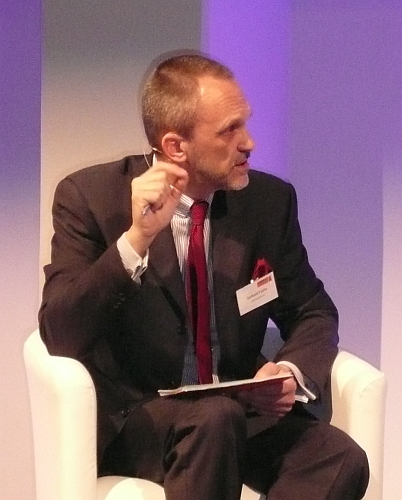 |
|
| Gerhard Fuchs. |
Basically the question positions itself rather in what it costs the owner to have a brand at their property and what added value this brings to them. As an example, he pointed to the Black Forest luxury gourmet resorts, Traube Tonbach and Bareiss in Baiersbronn: They have a regular guest portion of more than 70 percent because their owners personally look after the guests. "A brand is sometimes overrated. If the property is poorly directly, the best brand benefits nothing", Schroeder believes. Likewise, he holds it as important that external operators are involved one way or another in the preservation of the real estate. "Brand construction is a question of discipline", he explained.
Marriott brands should provide security
"The buying process has changed. Previously, marketing was like a funnel. The more I dumped into the top, the more that came out of the bottom", explained Morgan. This has changed in view of the varied marketing possibilities and Social Media. Those who enter "five-star hotel in Berlin" in Google today would receive indication of different brands there and would first ask for reviews in their digital ego-system. "Although people will happily discover the new, but with a certain security", says the brand expert.
Marriott wants to provide exactly this security to customers and owners. A few years ago, the group introduced the "Autograph Collection" brand as the "loosest" connection possibility for individual hotels. Their members experience the distribution advantages of the Marriott system as well as in the area eCommerce. Marriott itself discloses that newly developing locations in this manner would be too costly.
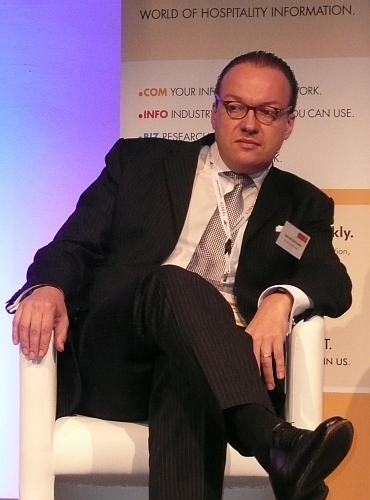 |
|
| Bernold Schroeder. |
Marriott is not only further developing "soft brands" like Autograph, but also successful US brands. After a rather hesitant start of Courtyard by Marriott occurred a few years ago in Europe, the group now wants to roll over the market anew with it. "We have tuned Courtyard to other markets for this. The former room was too expensive. We had to change the product in order to expand with it. The theory that a model fits everywhere no longer functions," according to Hirzalla. Besides, social networks and the status of a brand on the internet will increasingly win more influence on the staff acquisition. "We must appeal to the young people with the language that they themselves speak. We must come down to their communication level. The apps and the social networks that they use themselves are perfectly suited for this," the Marriott manager was convinced.
By the end of the discussion group, all looks were directed once again to Asia. Presenter Fuchs as well as the platform participants and guests wanted to learn the tips by Schroeder for contact with the Chinese guests. "At the Chinese hotels, there are many small, private rooms. No Chinese person will happily sit in a full restaurant where they can be seen", he said. In addition, the Chinese want room service and no mini bar. They maintain other sauna customs, expect a water kettle on the room and at least one mandarin speaking staff member at reception. Basically, the Chinese travelled to 3- to 5-star hotels. "Those who are really interested in Chinese guests must build upon a connection with the Chinese market", advised Schroeder. "In China, it is all about respect." / sst, map
Continuative Links:
- Summaries and videos of all panels of ITB Hospitality Day 2012
- March 23, 2012 I love this company:
- March 16, 2012 Battle for online dominance: ITB distribution panel: Which portals will fall by the wayside?
To print this article you have to be registered and logged in for newsletter, visitor or subscription.





